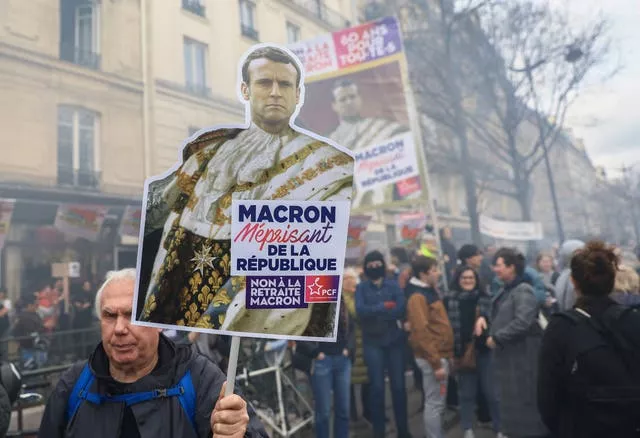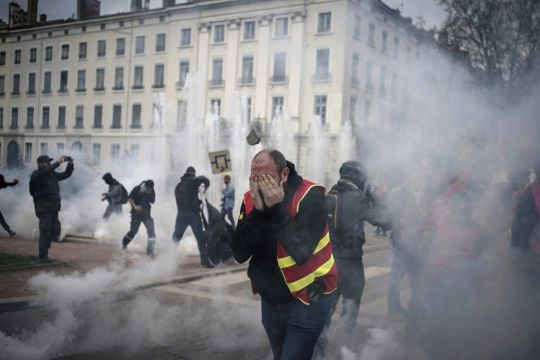French unions have called for new nationwide pension protests next week, which will coincide with the visit by Britain's King Charles.
The announcement follows a record turnout in Paris against French president Emmanuel Macron’s unpopular Bill to increase the retirement age from 62 to 64.
French authorities say 119,000 people marched through the capital on Thursday, which the Interior Ministry said was the biggest demonstration in Paris so far. It said the march was marred by violence, as were numerous others elsewhere.
The heavy wooden door of the elegant Bordeaux City Hall was set on fire and quickly destroyed on Thursday evening by members of an unauthorised demonstration, the Sud Ouest newspaper said.

More than one million people joined marches around the country a day after Mr Macron further angered his critics by standing strong on the legislation that his government forced through parliament without a vote, the ministry added.
Charles and his wife Camilla are due to travel to Paris on Sunday on his first state visit as king, and then visit Berlin from March 29th-31st.
A lavish banquet at the Palace of Versailles hosted by Mr Macron could be moved or even cancelled according to reports.
It is understood the trip’s logistics have been under review for some days, but any security considerations could reduce interactions with the public and lessen the impact of the visit aimed at strengthening ties between the UK and its continental neighbour.
French interior minister Gerald Darmanin, visiting police headquarters on Thursday night as fires still burned in some Paris neighbourhoods, gave assurances that security “poses no problem” and that Charles will be “welcomed and welcomed well”.
He said there was “enormous degrading” of public buildings and commerce on Thursday, “far more important than in precedent demonstrations”.

“There are troublemakers, often extreme left, who want to take down the state and kill police and ultimately take over the institutions,” the minister said.
Violence marred several of the marches and strikes upended travel across the country as protesters blockaded train stations, Charles de Gaulle Airport in Paris, refineries and ports.
In Paris, street battles between police and black-clad, masked groups, who attacked at least two fast food restaurants, a supermarket and a bank, reflected intensifying violence and drew attention away from the tens of thousands of peaceful marchers.
Police, pelted by objects and fireworks, charged multiple times and used tear gas to disperse rioters.
A haze of tear gas fumes covered part of the Place de l’Opera, where demonstrators converged at the march’s end. Police estimated the “radical elements” at some 1,000 people.
Amid the chaos, one police officer was seen falling to the ground with his shield.
Colleagues dragged him to safety. Police said he was being treated but did not elaborate or say whether there were other injuries.

Violence also marred other marches, notably in the western cities of Nantes, Rennes and Lorient – where an administrative building was attacked and the courtyard of the police station was set on fire and its windows broken — and in Lyon, in the southeast.
Mr Darmanin denounced “unacceptable assaults and damage” at a state building and a police station in Lorient. “These actions cannot remain unpunished,” he tweeted.
High-speed and regional trains, the Paris metro and public transportation systems in other major cities were disrupted. About 30 per cent of flights at Paris Orly Airport were cancelled.
The Eiffel Tower and the Versailles Palace were closed due to the strikes.
Protesters blockaded major roads and junctions to slow traffic around big cities.
The French leader said on Wednesday that the government’s Bill must be implemented by the end of the year.
Critics attacked him for the statement, describing him as “self-satisfied”, “out of touch” and “offensive”.
France’s education ministry said in a statement that about 24 per cent of teachers walked off the job in primary and middle schools on Thursday, and 15 per cent in high schools.

At Paris’ Gare de Lyon train station, several hundred strikers walked on to railway tracks to prevent trains from moving, brandishing flares and chanting “and we will go, and we will go until withdrawal” and “Macron, go away”.
“This year perhaps maybe our holidays won’t be so great,” said Maxime Monin (46), who stressed that employees like him, who work in public transport, are not paid on strike days. “But I think it’s worth the sacrifice.”
In the northern suburbs of Paris, several dozen union members blocked a bus depot in Pantin, preventing about 200 vehicles from getting out during rush hour.
Nadia Belhoum, a 48-year-old bus driver participating in the action, criticised Mr Macron’s decision to force the higher retirement age through.
“The president of the Republic… is not a king, and he should listen to his people,” she said.







